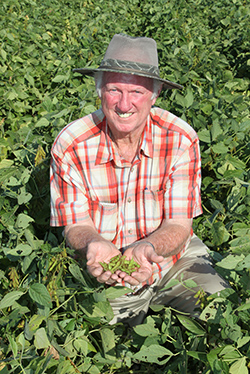Outstanding Young Farm Family – Feed Grains Division

Mike Dee didn’t grow up on a farm but today he helps manage nearly 10,000 acres of the family farm in Pickens County. And with his well-known optimistic attitude, he can find an advantage in having not grown up around agriculture.”The biggest advantage for me is that by not growing up on a farm, I don’t know any limitations, ” he said. “The sky’s the limit. But there is a phenomenal learning curve–things a lot of people pick up growing up on a farm that I had to learn from scratch. I’ve been driven to find people to teach me, and you’ll find that with farmers, they are always willing to help and share what they know.”It’s that approach that earned Mike, his wife, Shannon, and their daughters Victoria, 4, and Isabella, 3, the title of Alabama’s Outstanding Young Farm Family in the Feed Grains Division.The Dees rotate their row crops between corn and soybeans, and with huge dryers and storage bins, they’re better able to control their marketing by selling when the price is best. This year, they have about 1,700 acres of corn, 500 acres of wheat and 2,200 acres of soybeans. They also have 3,000 acres used for grazing about 1,000 beef cattle and another 2,000 acres of trees planted in the Conservation Reserve Program. The Dees’ Brahman and Angus cross cattle have gained them a reputation for producing quality replacement heifers, and they sell their steers in truckload lots for the feed yard.While Mike’s sister, Annie, runs much of the business side of the farm, he’s responsible for the physical operation of the farm and serves as a full-time manager. But Mike hadn’t planned on a career in farming. He graduated from the University of Alabama with a degree in geology and planned to join the family’s oil business.”When I finished college, the oil business was in especially dark times. It was slow, and there wasn’t a good opportunity for me there,” Mike recalled. “There was a big need for me here on the farm, and it just sort of stuck. I wouldn’t trade it for anything.”Having such a large farm, it might seem difficult to keep track of everything. But using the latest technology, the Dees utilize precision farming to break down their operation into 10-acre tracks or even to one-acre at a time.”That’s the key to being successful,” Mike said. “You’ve got to manage each acre and get the very most you can out of it. The more precision ag we can use and the more we can best utilize our inputs, the more we can yield and the more competitive we can be.”And it’s working. This year, the Dees are experiencing their best corn crop ever, and soybeans look promising as well. Their early corn was yielding 160-180 bushels per acre, and they expect some later varieties to do even better.The Dees store as much of their corn as they can, and they’ve added more drying space to increase that amount to as much as 100,000 bushels. Much of what they sell is used for poultry feed. They also keep some of their corn and soybeans to mix a custom feed for their cattle.The Dees are willing to grow whatever will make them a profit, and that was a key factor in their decision to grow soybeans that aren’t genetically modified. “We ship most of our beans to the Gulf (of Mexico) where they’re exported for use in China or Japan,” Mike said. “Some farmers don’t understand why those countries don’t want genetically modified beans. Frankly, if they don’t mind paying a little more, I’ll grow whatever brings me the most money.”Shannon, who grew up in the small town of Fayette said, despite her background, moving to the farm was a big change. But, she added, it’s one that’s made her a better person. “Life is simpler here and things are more laid back,” Shannon said. “Living here lets me see the small things. I think our kids are really fortunate to grow up here and to see their daddy farming. They see the rewards of good, hard work.”Shannon was a teacher when the couple married, and she plans to return to that career when the girls are older, but for now, she said her most important job is to support Mike and be at home with their children. She said the girls are learning lessons that will last them a lifetime.”The kids can see the importance of a rain. They can see Mother Nature first hand and they can take in the wonderful work ethic they see and hopefully apply it to their lives,” she said.
